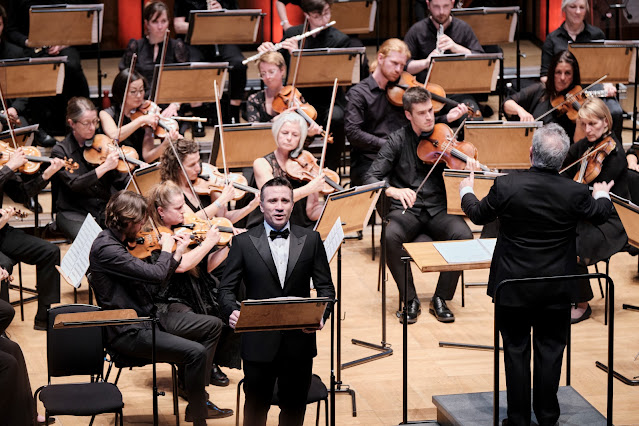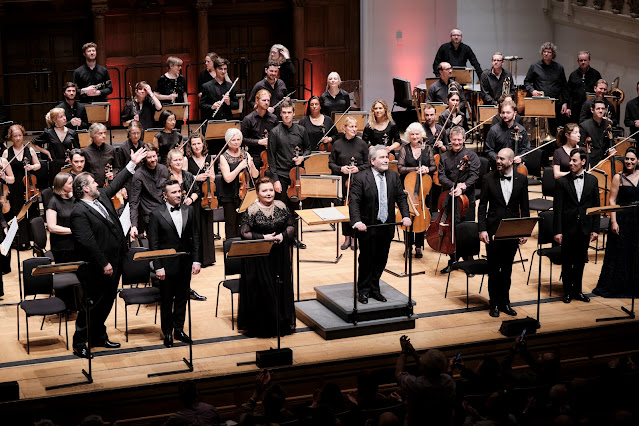 |
| Donizetti: L'esule di Roma - Nicola Alaimo, Albina Shagimuratova, Carlo Rizzi, Britten Sinfonia - Opera Rara at Cadogan Hall (Photo Russell Duncan) |
Donizetti: L'esule di Roma; Albina Shagimuratova, Sergey Romanovsky, Nicola Alaimo, Britten Sinfonia, Carlo Rizzi; Opera Rara at Cadogan Hall
With a mad scene for the baritone villain and an intense prison scene, this stylish performance showed Donizetti gradually moving away from the influence of Rossini
In 1822, Donizetti moved to Naples and began a relationship with the royal theatres there, in succession to Rossini who wrote nine operas for Naples between 1815 and 1822. In conventional chronology, Donizetti's serious operas for Naples are still journeyman works, very much dependent on the model of Rossini and it was only with Anna Bolena (written for Milan in 1830) that mature Donizetti begins. But Opera Rara wants to show us that Donizetti's operas from the 1820s do have something to say for themselves, so the company's latest project is a recording and performance of Donizetti's L'esule di Roma , ossia Il proscritto (The Exile from Rome, or the Proscribed Man) a melodramma eroico written for Naples in 1828 with a libretto by Domenico Gilardoni. This continues the theme of earlier Opera Rara projects, and in fact, Gilardoni would write the libretto of Donizetti's 1829 Neapolitan opera, Il paria which Opera Rara presented in 2021 [see my review] and his 1830 opera, Il diluvio universale which Opera Rara recorded in 2005.
Opera Rara presented Donizetti's L'esule di Roma at Cadogan Hall on Thursday 11 May 2023. Carlo Rizzi conducted the Britten Sinfonia with Albina Shagimuratova as Argelia, Nicola Alaimo as Murena, Sergey Romanovsky as Settimio, Lluis Calvet i Pey as Publio, Kezia Bienek as Leontina and Andre Henriques as Lucio and Fulvio.
 |
| Donizetti: L'esule di Roma - Sergey Romanovsky, Carlo Rizzi, Britten Sinfonia - Opera Rara at Cadogan Hall (Photo Russell Duncan) |
The opera is set in ancient Rome and concerns the senator, Murena (Alaimo) and his daughter Argelia (Shagimuratova). Argelia is in love with the tribune Settimio (Romanovsky), but he has been exiled by Murena. Despite being promised to the general, Publio (Lluis Calvet i Pey), Argelia continues to love Settimio. He returns to Rome, in disguise, to see her and is condemned to death. A reprieve comes at the last minute with a story drawn from the tale of Androcles and the Lion (!), and the opera ends with a happy rondo for Argelia.
A lot of the music does have a Rossinian cast to it, and the rather conventional writing for Settimio and Argelia follows the example of Rossini. Also, the rather compressed libretto is probably not one of the best that Donizetti set and the political machinations behind the plotting require a close reading of the text. But elements of the plot do seem to have engaged Donizetti's attention. Whilst the focus of the opera is firmly on Argelia, Settimio and Murena (Publio is a woefully underwritten role), it is Murena whose music takes us into new areas.
Murena has falsified the evidence for Settimio's exile, and throughout the opera he is anxious and worried, far less the conventional operatic villain than we might expect. The whole first scene, where Publio comes to claim Argelia and she cannot be found, is rather remarkable complete with a large-scale aria for Murena who expresses his anxiety.
What follows is more conventional, an entrance aria for Settimio and a duet with Argelia, but the act ends with something else. Murena returns, having helped condemn Settimio to death in the senate, Argelia learns from Settimio that her father is the instigator of the conspiracy, and Settimio is willing to go to his death. The result is a terrific large-scale trio that never quite goes where you expect it as the three characters each make a different journey. There is no chorus, and so the act ends in unconventional manner with a trio.
Act Two opens with what can be termed a mad scene for Murena, a remarkable piece of writing. Donizetti uses entirely conventional means here, a double aria (cavatina and cabaletta) but shows the skill and imagination he would bring to bear in his mature operas when such scenes were largely written for the heroine. A duet between Murena and Argelia (who is reluctant to condemn her father and thus torn between father and lover) continues the drama, and here Argelia's music also leaves Rossini behind as the two give us pre-echoes of both mature Donizetti and even early Verdi. This is remarkable stuff, and hints at the way Donizetti's imagination needed to be engaged to create music that really sparks to life.
This is followed by a prison scene for Settimio (added for the work's first revival), and again this explores darker more interesting territory, moving Settimio away from the lyric Rossinian writing of Act One. The ending of the opera, however, is something of a disappointment as the focus returns to the prima donna and she brings things to a conclusion with a stunning rondo a la Rossini.
Nicola Alaimo really grasped the opportunities given by the role of Murena, from the first moments of his opening aria it was clear that Alaimo was giving us a wonderfully dramatic account of Murena's descent from anxiety into madness. There was a great physicality to Alaimo's performance, and when he was performing the drama was riveting, however, he never pushed the envelope of the music beyond what Donizetti wrote, he was always stylish and a pleasure to listen to.
Albina Shagimuratova dazzled as Argelia, and in her final rondo and her opening duet with Romanovsky's Settimio, her command of technique and style meant that we didn't mind that the material was somewhat conventional. With a final rondo sung like this, who can complain!
The trio that concluded Act One, saw Shagimuratova, Romanovsky and Alaimo on great form and this was anything but conventional as the three characters explored their own demons, but it was in Shagimuratova's Act Two duet with Alaimo that the core of the opera came out and both artists were on peak dramatic form here.
Sergey Romanovsky is a wonderfully stylish lyric tenor whom we heard in 2018 in the title role of Verdi's Don Carlos (in the original grand opera version) in Lyons [see my review]. He continued to impress with his command of both style and technique. However, in Act One, he failed to make Settimio anything more than conventional, though it was a joy to listen to his stylish singing. In their duet, both Shagimuratova and Romanovsky seemed fatally score-bound and the drama between the two characters never sprang to life. But Romanovsky made up for this with a superb account of his prison scene in Act Two, still stylish, still a joy to listen to, but now with a sense of character and drama.
Lluis Calvet i Pey impressed as Publio, managing to convey the character's uprightness and nobility. It was only a shame that Donizetti and Gilardoni seemed to lose interest in him after the opening scene. Kezia Bienek provided stylish support in the small role of Argelia's friend, Leontina, whilst Andre Henriques popped up twice in the small roles of Lucio and Fulvio.
The role of the chorus was a relatively compact one, but the Opera Rara chorus admirably delivered what was expected of it. The relatively large forces of the Britten Sinfonia (double woodwind, four horns, trumpets, trombones, cimbasso and harp, plus a 12 piece banda) filled the stage and gave us a sense of the luxurious forces available to composers in Naples. Under Carlo Rizzi's direction, they brought the opera to life, and it was the orchestral writing that brought out the sense of drama in the large-scale scenes. I loved the interaction between orchestra and banda in the more complex public scenes, but the orchestral introduction to Settimio's prison scene was remarkable.
There is perhaps a little too much of Donizetti looking back to Rossini in L'esule di Roma for it to really take root on the stage, but given the right singing actor in the role of Murena it is clear that the opera does offer some remarkable drama. This was, in many ways, an admirable performance, full of stylish singing, though it was only when Donizetti's music intermittently took wing that the drama did too.
Never miss out on future posts by following us
The blog is free, but I'd be delighted if you were to show your appreciation by buying me a coffee.
Elsewhere on this blog
- Giovanni Legrenzi: Rinaldo Alessandrini and Concerto Italiano explore motets by one of Venice's most prominent composers - record review
- The Library of a Prussian Princess: Ensemble Augelletti at the Newbury Spring Festival - concert review
- Meditating, listening & letting the music unfold: Syrian composer & musician Maya Youssef on the inspirations behind her music - interview
- Cautionary Tales: the current cohort of Young Artists from the National Opera Studio in an evening of contemporary opera - opera review
- Temple Song: Kate Royal, Christine Rice & Julius Drake in Brahms, Schumann and Weill - concert review
- Silence, texture and atmosphere: music by John Luther Adams, Kaija Saariaho, Judith Weir, and Gary Carpenter at Royal Academy of Music's Fragile Festival - concert review
- Casta Diva: trumpeter Matilda Lloyd showing just what her instrument can do with elegant yet dazzling accounts of Italian bel canto arias - concert & record review
- Stop Motion Music: Edinburgh-based composer Neil T. Smith chats about his new disc, exploring the smaller-scale works he has written from the last eight years - interview
- Henryk Górecki's Symphony of Sorrowful Songs: an astonishing visual treat from Isabella Bywater at ENO - opera review
- Leipzig 1723: we know Bach won, but the fascination of hearing the application cantatas for the Thomaskantor position from Telemann, Graupner and Bach in superb performances - record review
- Music for wind: the OAE's Night Shift at Brixton's The Blues Kitchen - concert review
- Home












No comments:
Post a Comment